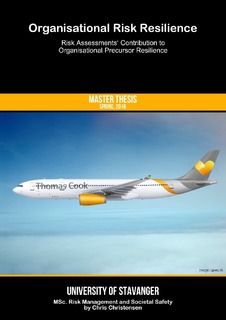| dc.description.abstract | The resilient organisation has recently become a focus for many safety risk professionals, as it offers the attractive idea of the attainable strategy to prepare for and deal with various types of adversity. Even though the safety science literature has been preoccupied with the normative study of the resilient organisation, a lack of empirical knowledge seems to exist of how this can be attained (Boin & Van Eeten, 2013).
The purpose of this research was to relate certain organisational characteristics and processes to organisational resilience. However, the notion of organisational resilience is intricate, as it is not a phenomenon which can be directly observed. To overcome this, this research has sought to establish a correlation between the anticipatory principles from collective mindfulness, with the notion of organisational resilience pertaining to the preventative activities prior to a disruption; labelled precursor resilience. By expositing the characteristics related to precursor resilience from the literature, this research established a conjectural link to the anticipatory principles as one measure of precursor resilient performance.
This research has thus operationalised the anticipatory principles to investigate in what way the airline, Thomas Cook Airlines Scandinavia, is collective mindful in its risk assessment activities in relation to a management of change. The generated empirical knowledge has been collected based on ten interviews within this company, and then analysed to uncover organisational characteristics and processes that can be related to precursor resilience.
Although the link between precursor resilience and the anticipatory principles is merely conjectural, this research found that several characteristics and processes of the risk assessment activities in relation to a management of change could be related to precursor resilience. However, many of the characteristics and processes pertaining to precursor resilience from these types or risk assessments should not be seen independently, but in a much larger organisational context. It appears from this research, that for an organisation to maintain and operate within a precursor resilient zone, requires an organisational capacity to ensure upholding the organisational activities revolving around the risk assessment in relation to a management of change. | nb_NO |
